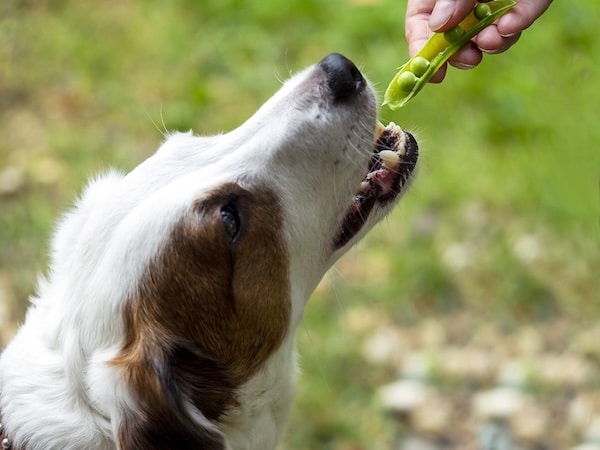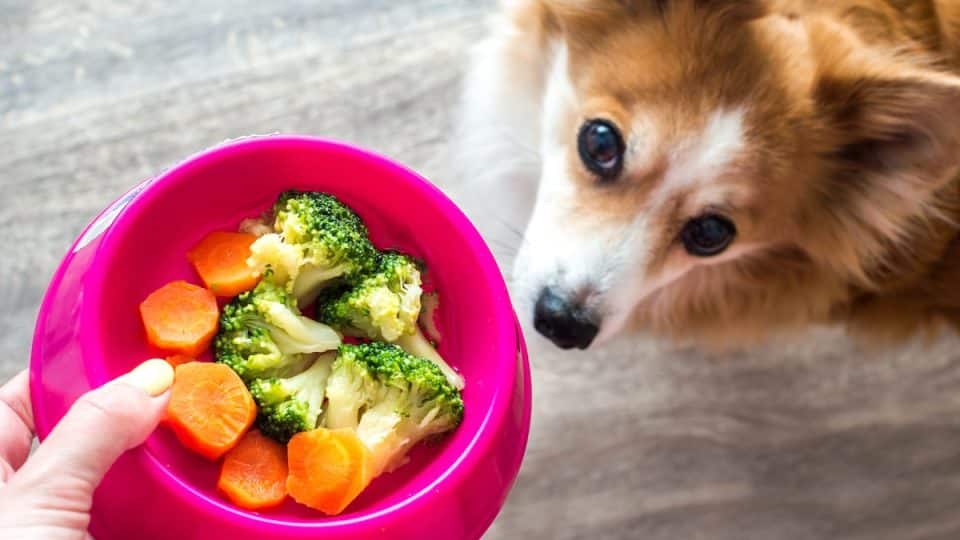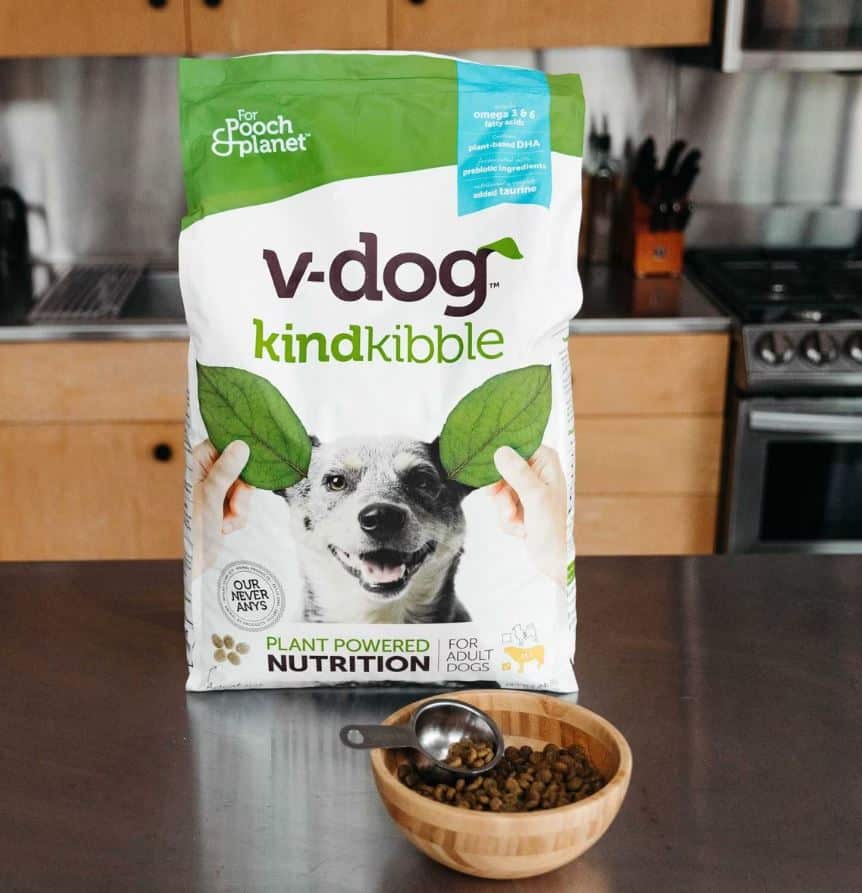- This post contains affiliate links. Read more here.
- Not a substitute for professional veterinary help.
From ethical and environmental concerns to a reduced risk of chronic health problems, there are many reasons to consider a plant-based diet. But what about pets? Can dogs be vegan?
The short answer is yes, dogs can be vegetarian or vegan. But a vegan diet for dogs isn’t as simple as just swapping meat for plant-based proteins.
In this guide, we’ll explore the research surrounding plant-based diets for dogs, including the risks involved. Read on to learn what to consider before switching your dog to a meat-free diet and how to do it safely with your vet’s help.
Are Vegan and Vegetarian Diets Healthy for Dogs?
An ideal diet for dogs provides essential nutrients in a form their body can utilize efficiently. Though there’s some debate on the matter, many experts agree that dogs are omnivores, not carnivores.
Key aspects of dogs’ anatomy enable them to digest and derive nutrients from both meat and plants:
- Molars with relatively flat surfaces designed to grind up bones as well as fibrous plant material.
- The ability to digest the majority of carbohydrates they consume.
- A small intestine that occupies about 23 percent of the total gastrointestinal volume, which is consistent with other omnivores.
- The ability to create an essential nutrient, vitamin A, from beta-carotene found in plants.
So, if the question is “can dogs be vegan,” the answer appears to be yes. Whether they should be is another matter.

Many vegetables are safe for dogs to eat but a vegan diet may not be ideal for all dogs. Ivan Pantic via iStock
A properly formulated vegetarian diet for dogs can be nutritionally complete. Some evidence suggests it may even be beneficial for dogs with allergies or advanced liver disease.
Though the long-term effects of such diets aren’t yet clear, there are several scientific studies in which meat-free diets for dogs have been successful.
In a 2009 study involving racing Siberian Huskies, 16 weeks on a meat-free diet did not significantly impact competitive performance. Another study involving companion animals in Europe did not reveal diet-related clinical abnormalities in pets being fed a vegan diet for a minimum of six months.
A 2023 analysis of existing research concluded that there is no convincing evidence of any major negative impact of vegan diets on dog health. The results of a 2021 study even suggest that dogs may find plant-based diets no less palatable than meat-based diets.
Ultimately, while it is possible to feed dogs a vegetarian or vegan diet, pet parents should exercise caution and work with a veterinarian to prevent dietary deficiencies.
Things To Consider When Going Meat-Free
A plant-based diet for dogs requires careful attention to nutritional balance. It’s essential to consult with a vet or animal nutritionist, especially if you’re going to make the food yourself. Here are some key considerations to make before feeding your dog a vegan or vegetarian diet.
Adequate protein intake
According to nutrient profiles established by the Association of American Feed Control Officials (AAFCO), a nutritionally complete diet for adult dogs must contain at least 18 percent protein. For puppies and pregnant or lactating female dogs, the minimum requirement is 22.5 percent.
Look for a commercial vegan dog food that meets these minimum requirements. Instead of meat, check for high-protein plant ingredients like beans or legumes. Plant protein concentrates like potato protein, pea protein, or soy protein isolate can also help meet your dog’s protein requirements.

Peas offer a rich source of plant-based protein. Natalya Maisheva via iStock
Essential vitamins and minerals
Most commercial dog foods contain synthetic vitamin and mineral supplements to meet AAFCO minimums. In vegan dog food, however, certain vitamins and minerals are particularly important—those that would typically come from animal ingredients.
For example, meat would typically provide essential minerals like iron, calcium, and phosphorus as well as B vitamins. As plant-based alternatives, grains and legumes are rich in B vitamins and phosphorus, while green vegetables offer calcium and small amounts of iron. Kelp is a strong source of plant-based iron.
Though scientific research is still somewhat limited, some studies have shown vegan diets for pets to be deficient in some nutrients and excessive in others. Vitamin D is a common concern with vegan dog diets, for example. Dogs on a vegan diet may require additional vitamin D supplementation.
Amino acid imbalance
Meeting your dog’s protein requirements is only one piece of the puzzle. Proteins are made up of amino acids, and the ones dogs aren’t capable of synthesizing from other chemicals in the body must be provided by their diet. These are called essential amino acids.
Plant proteins do not contain all the essential amino acids dogs need—meat does. A balanced vegan dog diet should contain a combination of plant proteins that provide the ideal ratio of essential amino acids. Amino acid imbalance can put your dog at risk for serious health issues like heart disease.
Dog-safe ingredients
Purchasing a commercial vegan dog food is the best way to ensure your dog’s diet is safe. If you’re making the food yourself, be sure to avoid foods dangerous to dogs. This includes things like onions, garlic, grapes, and avocado.
Vegan and Vegetarian Dog Foods on the Market
As the popularity of meat-free dog diets increases, more options are available. Just because a product is vegan or vegetarian, however, doesn’t necessarily mean it’s a high-quality option. You still need to evaluate the product and check with your vet to make sure it’s a good fit for your dog.
When choosing a plant-based diet for your dog, consider sticking to a similar food type. If your dog is currently eating dry food, for example, V-Dog Kind Kibble might be a good choice. This plant-powered recipe includes protein from peas, lentils, and whole grains.
For picky dogs who won’t eat dry food, canned food might be more appealing. High-moisture diets can also be beneficial for dogs with kidney or urinary issues. However, your vet may have specific recommendations in this case.
Another high-moisture option is rehydrated freeze-dried or dehydrated vegetarian dog food. Just keep in mind that some products—like The Honest Kitchen’s dehydrated base mixes—are not nutritionally complete. These foods may need to be paired with supplements.
If you’re switching your dog to a plant-based diet out of environmental concerns, do a little extra research about the manufacturer. Some brands like Addiction, for example, source their ingredients from local farms and pay particular attention to sustainability.
Tips for making the transition
Any change to your dog’s diet should be gradual. Rushing the process puts your dog at risk for digestive upset—not to mention refusal of the new food.
If you’re making a direct swap with similar types of food, you can simply mix the two together. Start with a 25 percent replacement with the new food and increase the proportion every few days until your dog is fully transitioned. When switching between different types of food, try using the old food as a topper to capture your dog’s interest.
Not ready to take the leap into a fully vegan dog diet? Take it slowly by swapping out your dog’s meaty treats for a plant-based alternative. You can also try feeding your dog meat-free meals a few times a month instead of every day.
Whether you choose to go fully vegan with your dog’s diet or not, be sure to discuss the change with your veterinarian. Your vet can help you monitor your dog’s reaction to the diet as well as their overall health.
How We Chose
We selected the products featured here based on a combination of our own hands-on testing, comprehensive analysis of customer reviews across a wide variety of retail platforms, and interviews with veterinary experts.
We prioritized dog food made with nutritious plant-based ingredients that are formulated following AAFCO’s nutrient profiles for dogs. Our picks are also influenced by the experience of living and playing alongside our own much-loved and strongly opinionated pets, who are never stingy with their feedback.
Further Reading
- Review: Open Farm’s Kibble Has High Standards for Sustainability
- The 11 Best Vegetarian Dog Treats
- Is High Protein Good for Dogs? Protein in Dog Food Explained
- The 9 Best Eco-Friendly Dog Toys To Help You Reduce Your Carbon Paw Print




